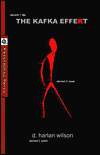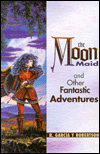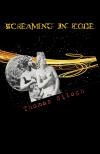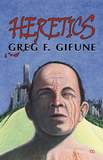
The Kafka Effekt, by D. Harlan Wilson
Book Review by James Michael White
Have you read this book?
"Things are unique and meaningful only by dint of their difference to other things." -- "The Cocktail Party," by D. Harlan Wilson*
Any book with "Kafka" in the title should signal prospective readers what they're letting themselves in for, so if you're looking for conventional fiction, this probably won't satisfy you. On the other hand, if you're open to gleeful tweaking of literary conventions, D. Harlan Wilson's The Kafka Effekt, from Eraserhead Press, should satisfy like a box full of literary candy.
Many of these stories are not really stories at all but rather sketches, and often cartoonish ones at that--think of the Mad Hatter plucking colorful tids and bits from an acid-tripping animator's skull. The writing is rife with literary allusions and manages to establish its own repertoire of symbols although, per their Kafka-esque leanings, those symbols often remain opaque. Their constant recurrence, however, creates a sense of no mere repetition, but of something larger at work here than the stories themselves ... like maybe an MA thesis (which happens to be no detriment).
Among these pages we find an acne-scourged fellow with the skin of a baby's bottom grafted onto his face, said fellow appalled because no one wants to touch it; a pediatrician named Thunderlove who scares children because his blue-irised eyes protrude on green-gray stalks; carnivorous breasts (yes, breasts) rampaging through a theater of absurd performances in which we may well view the head comic as a metafictive stand-in for the author; a fellow who crashes a cocktail party only to find giant hors d'oeuvres devouring tiny people, and who isn't horrified by it (nor are the tiny people); a clown-face shaped room in which skinless people sit in chairs upholstered with their own hide, plus a host of other oddities.
Much of this concoction is funny. Some of it is simply bizarre. Among the more enjoyable of the set, "Schoolgirl Road Rage" (reminiscent of Harlan Ellison's, "Along the Scenic Route") is filled with exuberant bravado, style, hyperbole and absurdism as an octogenarian bus driver transports her youthful charges to school. It also manages quick, emphatic social commentary with bits like: "Yet these days more than ever education is no less than pissed and shit on by the modern youth, who, if their Will was the Way, would set the earth aflame with the touch of a joystick button and henceforward bathe in the planet's ashes."
Yet Wilson explores broader ranges than the merely episodic.
Most impressive is "Circus" which, presented as a single paragraph, runs a mere two and-a-piece pages, neatly containing a rapid beginning, middle, and end wrapped around a compelling conflict. In the titular circus we find a faceless Egyptian telekinetic who shatters bricks with an impossible frown (he has no face, remember? think about that), and in this circus our protagonist discovers his girlfriend cheating on him after he returns from purchasing a snack. In despair he wanders, becoming lost in the circus, at last ending up in a dressing room "as much a maze as everywhere else in this place." It is here, at the twisted heart of things, that his despair peaks. It is also here that the faceless Egyptian mystic turns up again, revealing in grotesque fashion the way out of this maze. Although the protagonist thinks the Egyptian a fool for the seeming impossibility of his revelation, readers will intuitively understand its nature: if the circus represents the course of human events, then the escape from the maze has less to do with what is revealed than where it is revealed. The way out is, well, to say more would be to spoil a clever story.
In all fairness, however, not everything works.
"The Wiener Dog on the Ceiling" is one of them, which seems like one of those pieces of modern art which possesses form without purpose or meaning, existing as a Ding an sich. Such is to be expected in a work that, in part, models itself after a writer whose aim (well, part of it, anyway) was to defy interpretation. The advantage of writing stories that you say are intended to defy interpretation or evade meaning is that they don't have to "make sense" (not in a conventional sense, anyway). Or, to put it plainly, they don't have to be any good. Which in turn means anyone disputing their quality can then be accused of not understanding them.
Fortunately such wobbles are few, remain technically instructive for anyone attuned to such things, and are redeemed by the appearance of such witty pieces as "The Truth About Humpty Dumpty."
On the whole, however, The Kafka Effekt's stories entertain for at least a couple of reasons: first, they are unquestionably different from the mainstream (see relevant quotation above*); and second, they don't offer easy solutions, forcing readers instead to consider and then reconsider what they've read before arriving at a sense of understanding, and here "sense" is the appropriate word because attempting to analyze or "figure out" these stories is like unfolding origami to figure out how it gets its shape: You don't always get it put back together again and you don't always figure out how it got that way in the first place despite evident lines and patterns.
The lesson here is that some things exist not to be deconstructed but rather as objects which have their own, and sometimes singular, purpose: to be enjoyed. So enjoy The Kafka Effekt for the literary candy it is. Some of this candy is clear and hard and tasty, some isn't, and some has nuts inside.
Any book with "Kafka" in the title should signal prospective readers what they're letting themselves in for, so if you're looking for conventional fiction, this probably won't satisfy you. On the other hand, if you're open to gleeful tweaking of literary conventions, D. Harlan Wilson's The Kafka Effekt, from Eraserhead Press, should satisfy like a box full of literary candy.
Many of these stories are not really stories at all but rather sketches, and often cartoonish ones at that--think of the Mad Hatter plucking colorful tids and bits from an acid-tripping animator's skull. The writing is rife with literary allusions and manages to establish its own repertoire of symbols although, per their Kafka-esque leanings, those symbols often remain opaque. Their constant recurrence, however, creates a sense of no mere repetition, but of something larger at work here than the stories themselves ... like maybe an MA thesis (which happens to be no detriment).
Among these pages we find an acne-scourged fellow with the skin of a baby's bottom grafted onto his face, said fellow appalled because no one wants to touch it; a pediatrician named Thunderlove who scares children because his blue-irised eyes protrude on green-gray stalks; carnivorous breasts (yes, breasts) rampaging through a theater of absurd performances in which we may well view the head comic as a metafictive stand-in for the author; a fellow who crashes a cocktail party only to find giant hors d'oeuvres devouring tiny people, and who isn't horrified by it (nor are the tiny people); a clown-face shaped room in which skinless people sit in chairs upholstered with their own hide, plus a host of other oddities.
Much of this concoction is funny. Some of it is simply bizarre. Among the more enjoyable of the set, "Schoolgirl Road Rage" (reminiscent of Harlan Ellison's, "Along the Scenic Route") is filled with exuberant bravado, style, hyperbole and absurdism as an octogenarian bus driver transports her youthful charges to school. It also manages quick, emphatic social commentary with bits like: "Yet these days more than ever education is no less than pissed and shit on by the modern youth, who, if their Will was the Way, would set the earth aflame with the touch of a joystick button and henceforward bathe in the planet's ashes."
Yet Wilson explores broader ranges than the merely episodic.
Most impressive is "Circus" which, presented as a single paragraph, runs a mere two and-a-piece pages, neatly containing a rapid beginning, middle, and end wrapped around a compelling conflict. In the titular circus we find a faceless Egyptian telekinetic who shatters bricks with an impossible frown (he has no face, remember? think about that), and in this circus our protagonist discovers his girlfriend cheating on him after he returns from purchasing a snack. In despair he wanders, becoming lost in the circus, at last ending up in a dressing room "as much a maze as everywhere else in this place." It is here, at the twisted heart of things, that his despair peaks. It is also here that the faceless Egyptian mystic turns up again, revealing in grotesque fashion the way out of this maze. Although the protagonist thinks the Egyptian a fool for the seeming impossibility of his revelation, readers will intuitively understand its nature: if the circus represents the course of human events, then the escape from the maze has less to do with what is revealed than where it is revealed. The way out is, well, to say more would be to spoil a clever story.
In all fairness, however, not everything works.
"The Wiener Dog on the Ceiling" is one of them, which seems like one of those pieces of modern art which possesses form without purpose or meaning, existing as a Ding an sich. Such is to be expected in a work that, in part, models itself after a writer whose aim (well, part of it, anyway) was to defy interpretation. The advantage of writing stories that you say are intended to defy interpretation or evade meaning is that they don't have to "make sense" (not in a conventional sense, anyway). Or, to put it plainly, they don't have to be any good. Which in turn means anyone disputing their quality can then be accused of not understanding them.
Fortunately such wobbles are few, remain technically instructive for anyone attuned to such things, and are redeemed by the appearance of such witty pieces as "The Truth About Humpty Dumpty."
On the whole, however, The Kafka Effekt's stories entertain for at least a couple of reasons: first, they are unquestionably different from the mainstream (see relevant quotation above*); and second, they don't offer easy solutions, forcing readers instead to consider and then reconsider what they've read before arriving at a sense of understanding, and here "sense" is the appropriate word because attempting to analyze or "figure out" these stories is like unfolding origami to figure out how it gets its shape: You don't always get it put back together again and you don't always figure out how it got that way in the first place despite evident lines and patterns.
The lesson here is that some things exist not to be deconstructed but rather as objects which have their own, and sometimes singular, purpose: to be enjoyed. So enjoy The Kafka Effekt for the literary candy it is. Some of this candy is clear and hard and tasty, some isn't, and some has nuts inside.
| The Kafka Effekt, by D. Harlan Wilson on Amazon |
The Kafka Effekt, by D. Harlan Wilson on Amazon

| More Books You Might Like |
Comment on The Kafka Effekt, by D. Harlan Wilson
| Comments on The Kafka Effekt, by D. Harlan Wilson |
| There are no comments on this book. |




